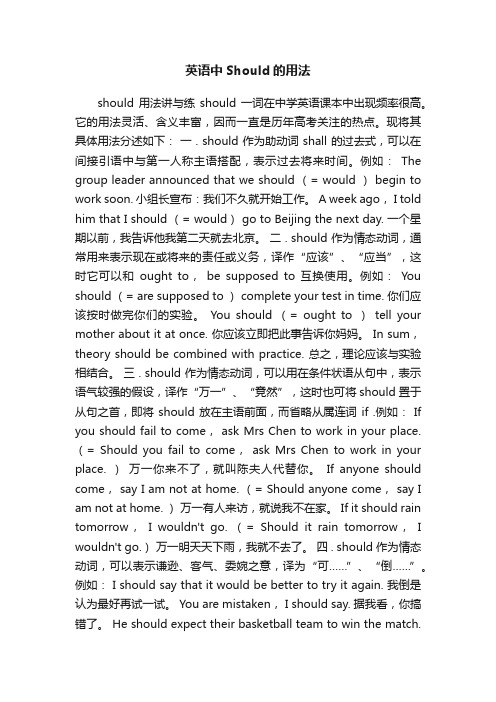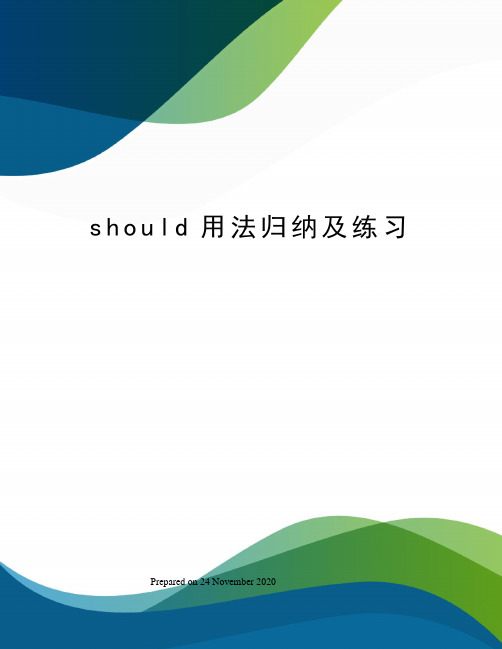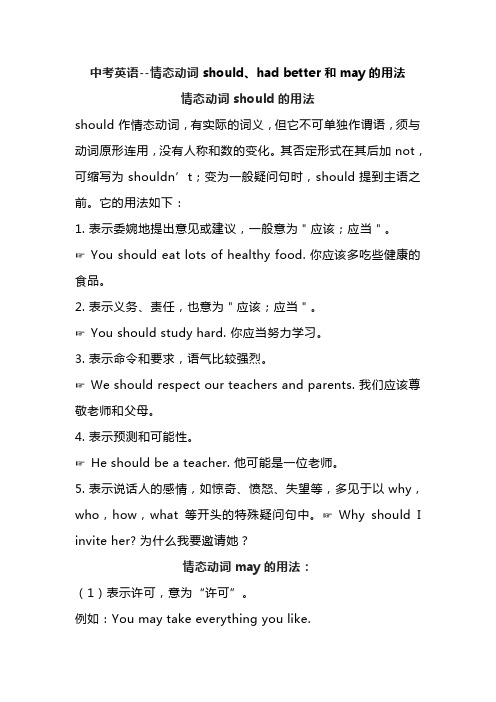should用法归纳与练习hbetter
should的用法总结

should的用法总结Should的用法总结。
Should是一个常用的情态动词,它在英语中有着多种用法。
在本文中,我们将对should的用法进行总结,帮助大家更好地理解和运用这一情态动词。
1. 表示建议或建议。
Should常常用来表示建议或建议。
比如,我们可以说,“You should eat more vegetables.”(你应该多吃蔬菜。
)这句话就是在向对方提出建议。
另外,should也可以用在虚拟条件句中,表示假设的建议,比如,“If I were you, I should take a break.”(如果我是你,我会休息一下。
)。
2. 表示期望或推测。
Should还可以用来表示期望或推测。
比如,我们可以说,“He should be home by now.”(他现在应该已经回家了。
)这句话表示我们对某件事情的期望或推测。
另外,should也可以用在疑问句中,表示询问对方的期望或推测,比如,“Shouldn't you be studying for the exam?”(你不应该在复习考试吗?)。
3. 表示义务或责任。
Should还可以用来表示义务或责任。
比如,我们可以说,“You should apologize for what you said.”(你应该为你说的话道歉。
)这句话表示对方有道歉的义务或责任。
另外,should也可以用在虚拟条件句中,表示假设的义务或责任,比如,“If I were you, I should help her.”(如果我是你,我会帮助她。
)。
4. 表示可能性或假设。
Should还可以用来表示可能性或假设。
比如,我们可以说,“She should be at the meeting by now.”(她现在应该已经在会议上了。
)这句话表示对某件事情的可能性或假设。
另外,should也可以用在疑问句中,表示询问对方的可能性或假设,比如,“Shouldn't it be raining by now?”(现在应该下雨了吧?)。
should的用法总结归纳

should的用法总结归纳"should" 是一个情态动词,用于表示建议、义务、推测、期望等含义。
以下是 "should" 的用法总结归纳:1. 表示建议:- You should study for the exam.(你应该为考试而学习。
)- She should see a doctor about her persistent cough.(她应该去看医生治疗她持续的咳嗽。
)2. 表示义务或责任:- Employees should arrive on time for work.(员工应该准时上班。
)- Citizens should pay their taxes on time.(公民应该按时缴纳税款。
)3. 表示期望或要求:- Students should respect their teachers.(学生应该尊重他们的老师。
)- Customers should provide accurate information when placing an order.(顾客在下订单时应该提供准确的信息。
)4. 表示推测或假设:- It should be sunny tomorrow.(明天应该是晴天。
)- She should be at the meeting by now.(她现在应该已经在会议上了。
)5. 在虚拟条件句中使用:- If I were you, I should apologize.(如果我是你,我应该道歉。
)1/ 2- He should have called, but he didn't.(他本应该打电话来的,但他没有。
)需要注意的是,"should" 是一种非常正式的用法,较为客观和礼貌。
在口语中,可以使用 "should" 的替代词如 "ought to" 或"need to"。
英语中Should的用法

英语中Should的用法should 用法讲与练 should 一词在中学英语课本中出现频率很高。
它的用法灵活、含义丰富,因而一直是历年高考关注的热点。
现将其具体用法分述如下:一 . should 作为助动词 shall 的过去式,可以在间接引语中与第一人称主语搭配,表示过去将来时间。
例如:The group leader announced that we should (= would ) begin to work soon. 小组长宣布:我们不久就开始工作。
A week ago, I told him that I should (= would) go to Beijing the next day. 一个星期以前,我告诉他我第二天就去北京。
二 . should 作为情态动词,通常用来表示现在或将来的责任或义务,译作“应该”、“应当”,这时它可以和ought to,be supposed to 互换使用。
例如:You should (= are supposed to ) complete your test in time. 你们应该按时做完你们的实验。
You should (= ought to )tell your mother about it at once. 你应该立即把此事告诉你妈妈。
In sum,theory should be combined with practice. 总之,理论应该与实验相结合。
三 . should 作为情态动词,可以用在条件状语从句中,表示语气较强的假设,译作“万一”、“竟然”,这时也可将 should 置于从句之首,即将 should 放在主语前面,而省略从属连词 if .例如: If you should fail to come, ask Mrs Chen to work in your place. (= Should you fail to come,ask Mrs Chen to work in your place. )万一你来不了,就叫陈夫人代替你。
should用法归纳与练习hbetter

should用法归纳一、Should 表示义务、责任、常译为“应当”,“应该”,或表示一种估计的情况,译成“按理应当”,“估计......”;Why should I pay him 为什么我该付给他钱They should be there by now, I think. 我估计,他们现在到那儿了;二、用于成语中I should like to......“我想做......”I should like to ask the teacher a question. 我想问老师一个问题;三、shouldn’t :不应该表示责备;应该不,应该没有表示推测;如:You shouldn't be so lazy.你不应该这么懒惰;There shouldn't be any problem with your listening.你的听力应该没有问题了;用should 或shouldn't 填空;1. All of us ________study hard and learn English well.2. As a student, you_______ eat in class.3. You _______speak to your parents like this ,you must be polite 有礼貌4. You __________eat less and take more exercise if want ot be healthier and stronger.5. My mother is very tired after work, I________ do some housework for her.had better常简略为'd better是一固定词组,had better"最好",用于表示对别人的劝告、建议或表示一种愿望;其用法有以下几点:一、had better后面必须跟动词原形;had better后跟动词原形即不带to的不定式,构成had better do sth.句型;这里的had不能用have来替换;如:You'd better go to hospital at once.你最好立即去医院看病;Tom, you'd better go there today.汤姆,你最好今天去那儿;二、主语不论是第几人称,句子不论是什么时态,都要用had better 的形式;如:Now youhe,we had better listen to the teacher.你他,我们现在最好听老师讲;三、had better的否定式;如:常用的否定形式是将否定副词not直接放在had better的后面;如:You had better not miss the last bus.你最好不要错过末班公共汽车;You had better not leave for Nanjing the day after tomorrow.你最好后天不要动身去南京;注意:否定副词not绝不能放在had的后面;如:不能说:You hadn't better go.而应该说:You had better not go.四、在祈使句中,had有时可以省略;如:Better not do it .最好别做那事;Better not wait for them.最好不要等他们;五、had better在表示对别人劝告、建议时,不宜用于与陌生人、长辈及上级的交谈中;对长辈说话时,最好不用had better;比较有礼貌的说法是:It might be better for you...;It would be better for you...;如:It might be better for you to help me,Grandpa.爷爷,您最好能帮我一下;练习下列各句都有一处错误,请改正;'d better to wait for me at the school gate.have better write to him now.had not better go there.。
should的用法总结

should的用法总结“should”是一个情态动词,用于表示建议、命令、责任、可能性、期望等含义。
下面是关于“should”的用法总结。
1. 表示建议:- You should study harder if you want to get good grades.(如果你想拿到好成绩,你应该更加努力学习。
)- Should I call her to confirm the meeting time?(我应该打电话给她确认一下会议时间吗?)2. 表示义务或责任:- Citizens should obey the law.(公民应该遵守法律。
)- We should help those in need.(我们应该帮助那些需要帮助的人。
)3. 表示可能性或推测:- It should rain tomorrow according to the weather forecast.(根据天气预报,明天可能会下雨。
)- The flight should have arrived by now.(飞机现在应该已经到达了。
)4. 表示情况的期望:- She should be here soon.(她应该很快就会到这里。
)- The package should arrive within a week.(包裹应该在一周之内送到。
)5. 表示命令或要求:- You should wash your hands before eating.(吃饭前你应该洗手。
)- Children should listen to their parents.(孩子们应该听从父母的话。
)6. 与"If"连用表示假设:- If I were you, I should apologize to him.(如果我是你,我会向他道歉。
)- If it should rain, we will postpone the picnic.(如果下雨的话,我们将推迟野餐。
had better, should, ought to用法

had better, should, ought to用法had better, should, ought to是重要的情态动词,也是高考重要考点,学习时应注意下列几点:一、了解相互间关系had better(最好), should(应该)与ought to(应该)均为提建议、阐述观点的情态动词,其后接动词原形。
should 比had better语气强,ought to语气最强。
一般情况下should与ought to可通用。
例1:You had better go there at once.你最好立即去那里。
例2:You ought to / should work hard.你应该努力工作。
值得注意的是:should还有"竟然"之意,表出乎意料。
例:You can't imagine that a well-behaved gentleman should be so rude to a lady.你真是难以想象这么一个有风度的先生对一个女子是如此之粗鲁。
二、掌握句型变换方法had better, should, ought to作为情态动词,各种句型变换均在自身形式上作变化。
(一)否定句had better, should, ought to用于否定句时,否定词均位于其后,具体形式为:had better not do, shouldn't / should not do, oughtn't to do。
例1:You had better not start at this time.此时你最好别出发。
例2:He shouldn't be careless in class.他上课时不应粗心。
例3:She oughtn't to waste time.她不应该浪费时间。
(二)一般疑问句had better, should, ought to用于一般疑问句时,分别将had, should, ought提至句首。
should用法归纳及练习

s h o u l d用法归纳及练习 Prepared on 24 November 2020should用法归纳及练习一、Should 表示过去将来时,即从过去观点看将来要发生的事,多用于间接引语中。
We thought that we should never see you again. 我们想我们再也看不到你了。
The BBC weather report this morning said that we should have rain.今天早上,BBC电台天气报告说,今天有雨。
二、Should 表示义务、责任、常译为“应当”,“应该”,或表示一种估计的情况,译成“按理应当”,“估计......”。
Why should I pay him 为什么我该付给他钱They should be there by now, I think. 我估计,他们现在到那儿了。
Should 用于完成时态,表示对过去发生的动作的一种推测,译成“应该已经......”。
You should have washed the wood. (But you haven‘t.) 你应该把伤口清洗了。
(然而你没有)三、在某些从句中,should 表示惊异、意外等情绪,常译为“竟然”。
It seems unfair that this should happen to me.真不公平,这件事竟然发生在我身上。
四、当陈述部分含有ought to ,其反意疑问句部分,美国英语中用should .She ought to stay here, shouldn't her她该留在这儿,是吗五、用于成语中I should like to......“我想(做)......”I should like to ask the teacher a question. 我想问老师一个问题。
六、"should (not) +have+过去分词(done)" 对已发生的事表示遗憾或责备,表达"本该或不该"之意。
had better, should, ought to用法

had better, should, ought to用法had better, should, ought to是重要的情态动词,也是高考重要考点,学习时应注意下列几点:一、了解相互间关系had better(最好), should(应该)与ought to(应该)均为提建议、阐述观点的情态动词,其后接动词原形。
should 比had better语气强,ought to语气最强。
一般情况下should与ought to可通用。
例1:You had better go there at once.你最好立即去那里。
例2:You ought to / should work hard.你应该努力工作。
值得注意的是:should还有"竟然"之意,表出乎意料。
例:You can't imagine that a well-behaved gentleman should be so rude to a lady.你真是难以想象这么一个有风度的先生对一个女子是如此之粗鲁。
二、掌握句型变换方法had better, should, ought to作为情态动词,各种句型变换均在自身形式上作变化。
(一)否定句had better, should, ought to用于否定句时,否定词均位于其后,具体形式为:had better not do, shouldn't / should not do, oughtn't to do。
例1:You had better not start at this time.此时你最好别出发。
例2:He shouldn't be careless in class.他上课时不应粗心。
例3:She oughtn't to waste time.她不应该浪费时间。
(二)一般疑问句had better, should, ought to用于一般疑问句时,分别将had, should, ought提至句首。
should用法归纳

should用法归纳Should 用法归纳Should 是一个常见的情态动词,用来表示义务、建议、推测以及对过去发生的事情的猜测。
在本文中,我们将归纳总结 should 的多个用法及示例,以帮助读者更好地理解和运用这一语法结构。
1. 表示义务或责任Should 可以用来表示某种期望、义务或责任。
在这种用法中,should 往往用于第二或第三人称,与动词原形连用。
例如:- You should finish your homework before going out to play. (你应该在外出游玩之前完成作业。
)- We should respect our elders. (我们应该尊敬长辈。
)- Parents should take care of their children's well-being. (父母应该关注孩子的幸福。
)2. 表示建议或劝告Should 也可以用来给出建议或劝告,提示某人采取特定的行动或避免某种行为。
这种用法常出现在虚拟语气的句子中。
例如:- You should see a doctor if you have a persistent cough. (如果你持续咳嗽,你应该去看医生。
)- I think you should apologize for what you said. (我认为你应该为你所说的道歉。
)- If you want to improve your English, you should practice speaking every day. (如果你想提高你的英语,你应该每天练习说话。
)3. 表示推测或可能性Should 还可以用来表示推测或可能性,表达某种程度上的猜测或判断。
在这种用法中,should 后面通常跟上动词原形。
例如:- He should be at home by now. (他现在应该在家了。
)- It's already 9 o'clock. She should have arrived by now. (已经九点了,她现在应该到达了。
should用法归纳与练习had better知识讲解

should用法归纳一、Should 表示义务、责任、常译为“应当”,“应该”,或表示一种估计的情况,译成“按理应当”,“估计......”。
Why should I pay him? 为什么我该付给他钱?They should be there by now,I think. 我估计,他们现在到那儿了。
二、用于成语中I should like to......“我想(做)......”I should like to ask the teacher a question. 我想问老师一个问题。
三、shouldn’t :不应该(表示责备);应该不,应该没有(表示推测)。
如:You shouldn't be so lazy.你不应该这么懒惰。
There shouldn't be any problem with your listening.你的听力应该没有问题了。
用should 或shouldn't 填空。
1. All of us ________study hard and learn English well.2. As a student, you_______ eat in class.3. You _______speak to your parents like this ,you must be polite (有礼貌)4. You __________eat less and take more exercise if want ot be healthier and stronger.5. My mother is very tired after work, I________ do some housework for her.had better(常简略为'd better)是一固定词组,had better"最好",用于表示对别人的劝告、建议或表示一种愿望。
should的三个基本用法

should的三个基本用法
1. Should 可以用来表示义务或责任,就好像我们必须要做的事情一样!比如说,“我 should 每天按时吃饭,这样才能保持身体健康。
”
2. 它也能表达一种建议呀,像“你 should 多去运动运动,这对你有好处!”
3. 还有呢,“他 should 好好学习,不然怎么能有好成绩呢?”,这里should 就表示一种期望。
4. “我们 should 一起出去玩玩呀,放松一下心情嘛!”这不就是一种我们认为应该做的事情嘛。
5. “她 should 早点睡觉,别老是熬夜啦!”,这多像是对她的一种关心式的要求呀。
6. “你 should 对他好点呀,人家对你那么好!”,是吧,这种时候就是在表达我们觉得对方应该采取的行动呢。
7. “他们 should 互相帮助,这样团队才能更强大啊!”,这就是在说一个团队中应该有的行为。
8. “我 should 改掉我的坏脾气,这样大家会更喜欢我吧。
”这就是自己对自己的一种要求和期望呀。
我的观点结论:should 的这三个基本用法真的很实用呢,能让我们更
好地表达自己的想法和态度呀!。
中考英语--情态动词should、had better和may的用法

中考英语--情态动词should、had better和may的用法情态动词should的用法should 作情态动词,有实际的词义,但它不可单独作谓语,须与动词原形连用,没有人称和数的变化。
其否定形式在其后加not,可缩写为shouldn’t;变为一般疑问句时,should 提到主语之前。
它的用法如下:1. 表示委婉地提出意见或建议,一般意为"应该;应当"。
☞ You should eat lots of healthy food. 你应该多吃些健康的食品。
2. 表示义务、责任,也意为"应该;应当"。
☞ You should study hard. 你应当努力学习。
3. 表示命令和要求,语气比较强烈。
☞ We should respect our teachers and parents. 我们应该尊敬老师和父母。
4. 表示预测和可能性。
☞ He should be a teacher. 他可能是一位老师。
5. 表示说话人的感情,如惊奇、愤怒、失望等,多见于以why,who,how,what等开头的特殊疑问句中。
☞ Why should I invite her? 为什么我要邀请她?情态动词may的用法:(1)表示许可,意为“许可”。
例如:You may take everything you like.(2)表示推测,通常用于肯定句和否定句中,意为“可能”。
例如:He may be very busy now.注意:can和may都不是可能性,can通常用于否定句和疑问句中,而may通常用于肯定句和否定句中。
虽然两者均可用于否定句中,但其意思不同:can't意为“不可能”,may not意为“可能不”。
另外,can和may均可表示请求允许,但can为一般用词,而may为正式用词。
had better的用法其意为“最好”、“应该”,后接动词原形,与情态动词should 用法相似,其中的had通常缩略为 'd。
牛津深圳八年级上 U8 should和had better练习(基础题)

had better , should 及 ought to都是情态助动词,为方便同学们学习使用,现将它们的主要用法归纳如下:一、had better 的用法1. had better 是固定词组,意思是“应该;最好”,后接不带 to 的不定式,其用法相当于情态动词,动词 had 没有人称或数的变化。
had better 常用来提出建议,语气较强,往往含有强迫或命令的口气,故常用于长辈对晚辈、上级对下级或平辈之间。
该短语指的是现在或将来的情况,而不是指过去。
had better的简略式为:'d better 。
如:1) You'd better go there by bus.你最好是坐公共汽车去那里。
2) We had better start at once .我们最好立刻出发。
2. had better的否定是had better not;疑问式是将 had 放在主语之前。
如: 1) We'd better not tell him the news.我门最好不要告诉他这个消息。
2)Hadn't we better go to the station to meet him ?我门去车站去接他们不是更好一点吗?3. 在反意疑问句中,疑问部分一般用“ had + 主语?”, 但有时也可用“ Will you ?”,表示一种请求或建议。
如:1)You'd better not go out today , had you ?今天你最好不要外出,好吗?2)I must stay at home this afternoon. You had better come to my house , will you ?我今天下午必须留在家里,你最好来我家,好吗?4. 对长辈或上级说话时,应避免使用 had better 。
比较礼貌的说法是 It may /might be better for you to do sth .。
九年级专项练习题情态动词should的正确用法及练习题

九年级专项练习题情态动词should的正确用法及练习题九年级专项练习题情态动词 "should" 的正确用法及练习题情态动词 "should" 是英语中常用的一个辅助动词,用来表达建议、义务、可能性、必要性等不同的情态意义。
正确使用 "should" 对于学习英语的九年级学生来说至关重要。
本文将详细介绍 "should" 的正确用法,并提供一些练习题,以帮助学生更好地掌握这一关键语法点。
**一、"should" 的基本用法**1. **表达建议**:"should" 用于给出建议或意见,常常表示应该做某事。
例如:- You should study for the test if you want to do well.- She should see a doctor if her condition doesn't improve.2. **表达义务**:"should" 也可以表示某种道义或法律上的义务。
例如:- Students should respect their teachers.- We should follow the rules of the road when driving.3. **表达可能性**:有时,"should" 表示某种可能性,尤其在疑问句中。
例如:- Should I bring an umbrella? (可能会下雨吗?)- Should we be concerned about the weather forecast?4. **表达必要性**:在某些情况下,"should" 可以表达必要性或适当性。
例如:- You should wear a helmet when riding a bike for safety.- I should clean my room before guests arrive.**二、常见错误用法**学生在使用 "should" 时常犯一些常见的错误,以下是一些需要避免的错误用法:1. **不必要使用 "should"**:有时学生会过度使用 "should",而使句子显得不自然。
情态动词should和 had better的用法2024年八年级英语寒假培优练(牛津深圳版 )

限时练习:40min完成时间:月日天气:作业06 情态动词should、ought to和had better的用法【要点回顾一】should 的用法Should为情态动词,意为“应该”,后接动词原形,其否定形式为,变为一般疑问句时,should 提到句首。
无人称和数的变化。
其用法如下:(1)表示委婉地提出意见或建议时,意为“应该,应当”。
You should brush your teeth before you go to bed.(2)表示义务,责任时,意为“应该,应当”。
You should help your mother with your housework.(3)表示命令或要求时,语气比较强烈。
You shouldn’t go out at night.【要点拓展】Ought to也可以表示劝告、建议,意为“应该”。
一般情况下,ought to 可以和should 通用,但是ought to 语气更强烈一些。
ought to 的否定式是:My parents are getting older and older. I ought to/ should visit them more often.【要点回顾二】had better 的用法had better 是一个固定短语,意为“最好”,用于表示对别人的劝告、建议或表示一种愿望。
其用法有以下几点:1.had better 后面必须跟动词。
had better 后跟动词原形(即不带to的不定式),构成短语,had不能用have来替换。
You’d better go to hospital at once.Tom, you’d better go there today.2.主语无论是第几人称,无论用什么时态,都要用had better的形式。
Now you/ he/ we had better listen to the teacher.3.had better的否定式:常用的否定形式是将not直接放在had better的后面,即.You had better not miss the last bus.一、单项选择1.You’d better ________ any noise at night.A.make B.to make C.not make D.not to make2.(2022上·广东广州·八年级执信中学校考期末)—You made a mistake. The spelling ________ be “friend”, not “fried”.—Oh, I see. Thanks.A.could B.can C.may D.should3.(2022上·广东广州·八年级广东番禺中学校考期末)You ________ loudly in the library, or you will bother other readers.A.ought not speak B.ought not to speak C.not ought to speak D.ought not speaking4.I think _________ a new dance is not easy. You should _________ it often.A.to learn; to practise B.learning; practice C.learn; practising D.learns; to practise 5.(2023·湖北黄石·统考中考真题)Young Chinese people ________ keep the motherland at heart, aim high, and have their feet firmly on the ground.A.should B.can C.may D.need6.(2023·内蒙古呼和浩特·统考中考真题)In most museums, there is no shouting and no running, and you________ touch anything.A.couldn’t B.can’t C.needn’t D.mustn’t7.(2023·江苏南通·统考中考真题)If a football team wants to enter the World Cup, it ________ become a member of FIFA first.A.may B.must C.can D.might8.(2023·江苏镇江·统考中考真题)The new app about fashion is really free and you ________ pay money for it.A.may B.must C.shouldn’t D.needn’t9.—Mom, could I go out with my friend for dinner?—Certainly, but you ________ finish your homework first.A.can B.could C.may D.should10.You ________ smoke in the office. It’s bad for the health of all the peopl e here.A.should B.had better C.needn’t D.shouldn’t一、完形填空(2022~2023上·广东广州·八年级增城中学校考期末)Do you think hard work always pays off? Here is the story about how I became successful. I’m very smart and I have spent 10 years 11 mechanics (机械学) but I have low education. I always tried my best to make people trust me but failed. I started this year having another factory job with a little 12 pay than my last one. I was making $ 13.50 an hour at my last job and had a hard time living. Though I was paid more, I still lived 13 . However, if you kept on and didn’t run away, you would succeed one day.Three months ago, my neighbor bought a used car. Everyone thought it had some 14 problems and had no idea. After taking a look at it, I said that I would be able to repair it if he could pay me $ 2,000. At last, he was very cheerful at my 15 and told many of his friends I really made it.In about two months more people came to me for working and I was making great 16 . Then one of my customers (顾客) 17 me with another good job that started even higher. It was 18 because I was able to let them believe in me by solving difficult problems. I finally 19 my new life.So everyone, remember not to give up your dream easily because 20 will come to you in the end with your hard work.11.A.learning B.selling C.stealing D.spelling12.A.less B.better C.longer D.smaller13.A.quickly B.warmly C.badly D.happily14.A.famous B.usual C.easy D.huge15.A.words B.smile C.work D.tools16.A.money B.art C.time D.food17.A.mixed B.filled C.compared D.provided18.A.expensive B.educational C.fantastic D.traditional19.A.created B.lost C.shared D.hurt20.A.excitement B.success C.love D.truth二、阅读理解(2022上·广东广州·八年级广州中学校考期末)Do you admire successful people? Do you think they had their success easily? As “Father of Hybrid Rice”, Yuan Longping got over great difficulties and spent his whole life working to reduce world hunger and helping to feed the country with the largest population.Wu Mengchao, the “Father of Chinese Hepatobiliary Surgery”, focused on saving people’s lives for nearly eighty years. He performed more than 16,000 operations (手术) during his life. Holding the knife for such a long time deformed his fingers. Wu once said, “It would be my greatest happiness if I could work at the operating table until my dying day.”In 1969, in order to solve the problem of treating malaria (疟疾), Tu Youyou, a pharmacologist (药学家) took on the job as head of a research team. She and her teammates performed different kinds of experiments. However, the results were disappointing. Instead of giving up, in 1972, they made it! In 2015, she received Nobel Prize.Thomas Edison, the inventor of the light bulb, believed that every failure was a step towards success. He once said, “If I find 10,000 ways something won’t work, I haven’t failed. I am not discouraged, because every wrong try is another step forward.”Sometimes, their success was a surprise, even to themselv es. The famous scientist Alexander Fleming said, “I certainly didn’t plan to revolutionize (变革) all medicine by discovering the world’s first antibiotic (抗生素). But I guess that was exactly what I did.”Some people only became successful after their deaths. Not like Pablo Picasso who became famous and very rich during his lifetime, the artist Vincent V an Gogh only sold one painting all through his life and that was to a friend. But he kept painting and he painted more than 2, 000 artworks in the following ten years. Now his paintings are very popular and they sell for millions of pounds.One thing all these people have in common is sticking to their goals no matter what.21.What do Yuan Longping and Wu Mengchao have in common?A.They succeeded in solving world problems.B.They achieved a lot in the medical field.C.They spent all their lives serving people.D.They are remembered for their happiness.22.Which of the following statements is TRUE?A.Pablo Picasso became famous after his death.B.Vincent Van Gogh painted 2, 001 artworks in his life.C.Thomas Edison tried 10, 000 ways before he invented the light bulb.D.It took Tu Youyou’s team about 3 years to reach their goal.23.How did Alexander Fleming feel about his discovery of the first antibiotic?A.He did n’t fully realize its importance.B.He didn’t plan to study all medicine.C.He knew exactly what his success meant.D.He felt too tired to stay awake.24.What does the writer mainly want to tell us?A.Not everyone can be successful.B.Great achievements ar en’t made naturally.C.The more difficulties, the better.D.Great hopes make great men.三、语法填空(2022~2023上·广东深圳·八年级统考期末)阅读下面短文,在空格处填入一个适当的词或使用括号中词语的正确形式填空。
should用法归纳及练习

should用法归纳及练习s h o u l d用法归纳及练习一、Should表示过去将来时,即从过去观点看将来要发生的事,多用于间接引语中。
Wethoughtthatweshouldneverseeyouagain.我们想我们再也看不到你了。
TheBBCweatherreportthismorningsaidthatweshouldhaverai n.今天早上,BBC电台天气报告说,今天有雨。
二、Should表示义务、责任、常译为“应当”,“应该”,或表示一种估计的情况,译成“按理应当”,“估计......”。
WhyshouldIpayhim为什么我该付给他钱Theyshouldbetherebynow,Ithink.我估计,他们现在到那儿了。
Should用于完成时态,表示对过去发生的动作的一种推测,译成“应该已经......”。
Youshouldhavewashedthewood.(Butyouhaven‘t.)你应该把伤口清洗了。
(然而你没有)三、在某些从句中,should表示惊异、意外等情绪,常译为“竟然”。
Itseemsunfairthatthisshouldhappentome.真不公平,这件事竟然发生在我身上。
四、当陈述部分含有oughtto,其反意疑问句部分,美国英语中用should.Sheoughttostayhere,shouldn'ther她该留在这儿,是吗五、用于成语中Ishouldliketo......“我想(做)......”Ishouldliketoasktheteacheraquestion.我想问老师一个问题。
六、"should(not)+have+过去分词(done)"对已发生的事表示遗憾或责备,表达"本该或不该"之意。
如:①Healsolearnsthatheshouldhavecaredmoreabouthisfriends.他还明白了他本应该多关心朋友。
should的用法总结

should的用法总结should表示应该,掌握should的用法对英语学习是很有必要的,下面小编给大家整理了should的用法总结,希望大家喜欢!should的释义(常用于纠正别人) 应该,应当; (提出或征询建议) 该,可以; (表示预期) 应该会,可能;should的用法■表示“应该,应当”He should work harder. 他应该更加努力。
You should help your mother with the housework. 你应该帮你母亲做家务。
Crime should be punished. 犯罪应受惩罚。
Should I wear a coat?我要穿大衣吗?■表示“可能,该(=will probably) ”He should arrive soon他可能很快就到了。
The train should have already left. 火车大概已经走了。
■表示“万一”If it should rain tomorrow, don’t expect me. 万一明天下雨,就不要等我了。
■表示“竟然”It’s strange that he should be late. 真奇怪,他竟会迟到。
■表示粗暴地拒绝一项建议、要求或指示—What time does the film start? 电影什么时候开始?—How should I know? 我怎么知道?—Ann’s very unhappy. 安非常不高兴。
—Why should I care? 这管我什么事?—Could your wife help us in the office tomorrow? 你妻子明天能到办公室来帮帮我们吗?—Why should she? She doesn’t work for you. 她为什么就该去? 她又不是为你们工作的。
■should加完成式:should have done表示“本应该做某事,但事实上却没有做”;shouldn’t have done表示“本不该做某事,但事实上却做了”。
- 1、下载文档前请自行甄别文档内容的完整性,平台不提供额外的编辑、内容补充、找答案等附加服务。
- 2、"仅部分预览"的文档,不可在线预览部分如存在完整性等问题,可反馈申请退款(可完整预览的文档不适用该条件!)。
- 3、如文档侵犯您的权益,请联系客服反馈,我们会尽快为您处理(人工客服工作时间:9:00-18:30)。
s h o u l d用法归纳与练习
h b e t t e r
集团企业公司编码:(LL3698-KKI1269-TM2483-LUI12689-ITT289-
should用法归纳
一、Should表示义务、责任、常译为“应当”,“应该”,或表示一种估计的情况,译成“按
理应当”,“估计......”。
WhyshouldIpayhim为什么我该付给他钱
Theyshouldbetherebynow,Ithink.我估计,他们现在到那儿了。
二、用于成语中Ishouldliketo......“我想(做)......”
Ishouldliketoasktheteacheraquestion.我想问老师一个问题。
三、shouldn’t:不应该(表示责备);应该不,应该没有(表示推测)。
如:
Youshouldn'tbesolazy.你不应该这么懒惰。
Thereshouldn'tbeanyproblemwithyourlistening.你的听力应该没有问题了。
用should或shouldn't填空。
1.Allofus________studyhardandlearnEnglishwell.
2.Asastudent,you_______eatinclass.
3.You_______speaktoyourparentslikethis,youmustbepolite(有礼貌)
4.You__________eatlessandtakemoreexerciseifwantotbehealthierandstronger.
5.Mymotherisverytiredafterwork,I________dosomehouseworkforher.
hadbetter(常简略为'dbetter)是一固定词组,hadbetter"最好",用于表示对别人的劝告、建议或表示一种愿望。
其用法有以下几点:
一、hadbetter后面必须跟动词原形。
hadbetter后跟动词原形(即不带to的不定式),构成hadbetterdosth.句型。
这里的had不能用have来替换。
如:
You'dbettergotohospitalatonce.你最好立即去医院看病。
Tom,you'dbettergotheretoday.汤姆,你最好今天去那儿。
二、主语不论是第几人称,句子不论是什么时态,都要用hadbetter的形式。
如:
Nowyou(he,we)hadbetterlistentotheteacher.你(他,我们)现在最好听老师讲。
三、hadbetter的否定式。
如:
常用的否定形式是将否定副词not直接放在hadbetter的后面。
如:
Youhadbetternotmissthelastbus.你最好不要错过末班公共汽车。
YouhadbetternotleaveforNanjingthedayaftertomorrow.你最好后天不要动身去南京。
注意:否定副词not绝不能放在had的后面。
如:不能说:Youhadn'tbettergo.而应该说:Youhadbetternotgo.
四、在祈使句中,had有时可以省略。
如:
Betternotdoit.最好别做那事。
Betternotwaitforthem.最好不要等他们。
五、hadbetter在表示对别人劝告、建议时,不宜用于与陌生人、长辈及上级的交谈中。
对长辈说话时,最好不用hadbetter。
比较有礼貌的说法是:Itmightbebetterforyou...;
Itwouldbebetterforyou...。
如:
Itmightbebetterforyoutohelpme,Grandpa.爷爷,您最好能帮我一下。
[练习]
下列各句都有一处错误,请改正。
1.You'dbettertowaitformeattheschoolgate.
2.Ihavebetterwritetohimnow.
3.Youhadnotbettergothere.。
